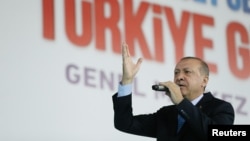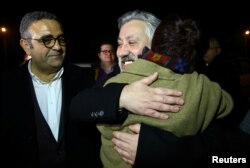Britain is set to roll out the red carpet Sunday as Turkish President Recep Tayyip Erdogan starts a three-day visit to London. The visit comes at an opportune time for him, ahead of the June 24 presidential elections, but it is controversial because he is facing growing accusations of authoritarianism.
Hosting Erdogan in the middle of an election campaign is seen as a sign of Britain's commitment to the Turkish president.
"It is a great honor to have him and to be able to host him in our capital city," Britain's ambassador to Turkey, Dominick Chilcott, said Friday.
Erdogan's reputation is increasingly tarnished by his country's human rights record. Rights groups designate Turkey as the world's worst jailer of journalists with more than 100 incarcerated reporters, along with tens of thousands of others jailed under emergency rule introduced after a 2016 failed coup.
"The Turkish regime is more and more isolated. Any photo opportunity is good during these harsh days. It's an opportunity for Erdogan to send a message at home that things are going all right," political scientist Cengiz Aktar said.
It's anticipated Erdogan won't face public criticism from his British hosts, with British diplomats maintaining that human rights concerns are best raised in private.
Observers point out that a sign of how controversial Erdogan has become is the fact this isn't a state visit with all the accompanying public pomp and ceremony, an honor granted to Erdogan's predecessor, Abdullah Gul, in 2011. Erdogan will, however, have tea with Queen Elizabeth.
Defense deals
British-Turkish relations have flourished since the 2016 failed coup. London was among the first of Ankara's Western allies to offer its support following the failed military takeover. The decision by a British minister to proceed with an already-arranged visit to Ankara, just days after the coup attempt, cemented London's credentials as a trusted ally. Ankara still remains critical of what it perceives as the slow response of other Western allies in supporting it after the failed coup.
"Even though Turkey is distancing itself from the Western alliance, an exception is made with Britain," said political analyst Atilla Yesilada of Global Source Partners.
British firms have reaped rich rewards from deepening bilateral ties. British defense companies have secured hundreds of millions of dollars in contracts. The centerpiece is a $130 million deal to develop and build a Turkish jet fighter.
Favored status
Trade is a key topic of Erdogan's visit. With Britain set to leave the European Union and Turkey's EU bid all but dead, analysts claim both sides see potential common ground and a solution to the threat of isolation.
"Turkey is using the UK as a bridge [to a wider world] and I think the feeling is mutual," said Yesilada. "Turkey thinks the bilateral trade and investments agreements could mitigate ... damage that might arise from any deterioration of relations with the EU, so they [the UK] do get favored treatment."
Favored treatment extends beyond trade. Intelligence cooperation is deepening. A "golden age" is how one Turkish diplomat described relations. Britain is offering assistance in Turkey's war against the Kurdish rebel group the PKK, while Ankara is helping London counter threats posed by Islamic State as well as tracking down British jihadists in Syria who are seeking to return home.
The European Union, while critical of Turkey's human rights record, is expected to take a pragmatic approach to Erdogan. In March, Donald Tusk, president of the European Council, and Jean-Claude Juncker, president of the European Commission, met with Erdogan in the Bulgarian resort city of Varna.
The meeting was seen as carefully choreographed to give the Turkish president a valuable photo opportunity, helping to enhance his statesman credentials at home. In February, Erdogan met in Paris with French President Emmanuel Macron.
"The EU is taking a careful line with Turkey," said political columnist Semih Idiz of al-Monitor. "The EU understands, at the end of the day, it needs to work with Erdogan and he is seen as the only game in town."
Observers point out most European diplomats are convinced Erdogan is certain to win the June elections, despite polls predicting a close election. Ankara's ongoing cooperation in curtailing migrants entering Europe is viewed as vital by the EU.
"Turkey is very close to the EU; there have been lots of statements made from both sides, sometimes harsh ones last year," the head of the EU delegation to Ankara, Ambassador Christian Berger, said Thursday. "That has now disappeared. I think the relationship is back onto engagement."
Such positive statements will be welcomed by Erdogan, who recommitted himself to pursuing EU membership for Turkey at a campaign rally.
Analysts warn that for Erdogan's opponents, these developments can only add to questions about the commitment of Turkey's Western allies to the democratic values they claim to uphold.
"The tolerance the regime enjoys in the West is intimately linked to what is happening to the rule of law in Turkey," Aktar said. "What the Europeans want is to trade with Turkey. They want Turkey's cooperation on the migrants, so all these laments from Europe about the rule of law in Turkey are just a charade."






